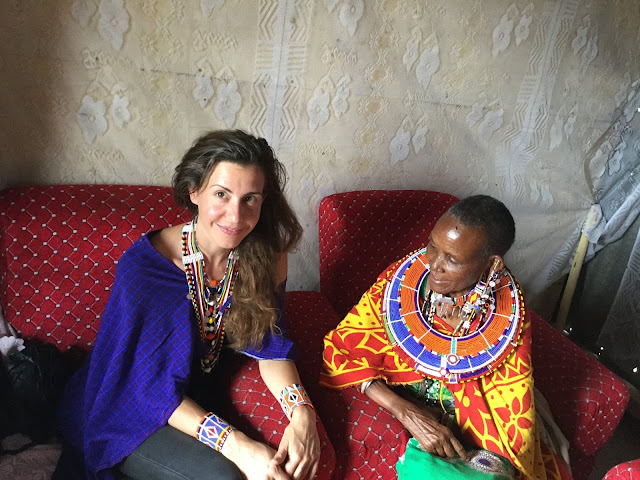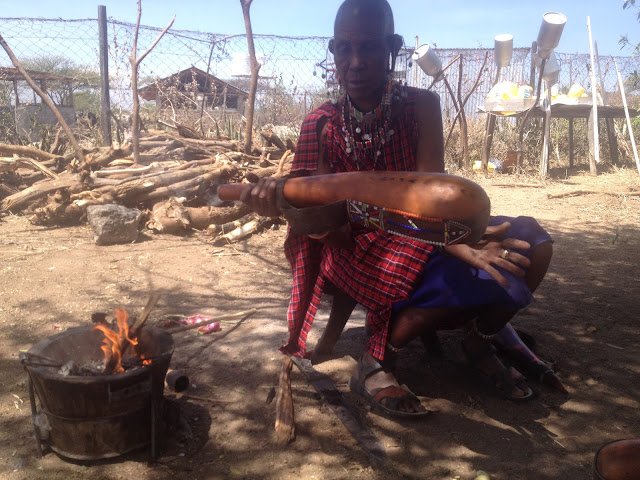The woman's circle
It's sunday in Endupa, the Matampash farm in the South of Kenya. I have asked Mama Seno to tell me a woman's story today. She has invited all the women from the village and I have baked a cake.
It's not common to call for a story. Stories turn up without warning normally, under a tree, while walking with kettle, making tea on the fire at night or on special ceremonial occasions. But it's not tradition to call for storytelling. Mama Seno answers my call though because she thinks it is important that the women from the village are reminded of the past.
"We have less and less time", she says, "to listen to our elders. Our daily lives have changed a lot over the past decades and modernity rushes through our society. The young women have forgotten our stories from the past. They have forgotten where we come from. And they are not anymore interested in our culture. I will be happy to remind them today and embrace this occasion and your interest in our tradition, today so endangered."
Mama Seno speaks with a certain melancholy in her voice and a nostalgia shades her face when she looks over the land into a distance I can't see.
"I am an elder now", she says, "and it's my responsibility to pass on our knowledge for our future generations. Also the women stories need to be passed on. I think it was better in the past. We were more respected. There was dignity and equality. Modernity has brought a lot of dis-balance in the relationship between men and women. Where women now think that they are emancipated, they have actually lost all power and they work twice as hard as in the past while the men spend their earned money in the bar. It's a big problem. Us elders, it's our responsibility to keep the men out of the bar. Maasai men are not used to drink. It's not good for them. It makes them aggressive and lazy.
Last week we managed to close one bar. We went in, all the women from the village, with brooms, and we swiped all our men outside and then we forced the bar owner to close his shop. We have power. We must simply use it and not be too impressed by what modernity offers us. Because I can tell you, what modernity offers us is of way less value than what nature and our traditions used to offer us in the past. We used to be rich and now we are poor. We used to have food in abundance. Nature offered us everything. Berries and herbs, fruits and milk and meat from our cows. We used to be healthy, have good teeth and bones, we used to never be ill and we used to understand why our babies cried and we could make them laugh again.
Nowadays we need to sell our cows to buy rice and maiz and vegetables from the market, we eat things that we were not used to eat, they make us ill. The cows get vaccins and treatments for all sorts of things, imposed by our government, and now we cannot drink the blood anymore and we cannot eat the meat raw. We get ill with diseases we don't understand. Our children don't know our plant medicine any longer. In schools they learn that our way of life is primitive and that it's evil to drink blood.
Now I can tell you, that the way we used to take blood, was very respectful of our cows. We took only what we needed and it didn't harm them. The blood was full of vitamins and minerals, it was a boost for our immune system. We were never ill. Now our children believe what they learn in the schools and they believe that our traditions are evil.
The pressure and the overruling power of the educational system and our government make that our children don't like to identify with their heritage anymore and that is very sad and also dangerous. Because what they get instead makes them ill and unhappy.
We used to be a very happy people. We used to care of one another, we never had any shortcomings, we shared everything and we laughed together, all day. Now I see our children individualizing and I see them struggling. They are hungry and searching for money, sometimes they sell all their cows and then they have no more wealth. I try to tell them to be proud and to stick to our values, but they don't listen to their elders anymore. Now they listen to the schoolteachers and the tv."
When the women from the village arrive we drink tea. We eat my cake and we dance and sing first to celebrate our gathering.
After dancing and singing we sit in a circle and we all listen to Mama Seno.
Realizing that this moment is precious because it becomes more and more rare that people sit down and listen their elders speak, touches me very deeply and makes me feel sad as well. Seeing how modernity ravages ancient traditions in such high speed, without any pity or self reflection. Today we still have Mama Seno who can talk about the old days, not so long ago... but what about the next generation? Whom can we turn to to ask about our past? Our school teachers? They come from the city, they are not Maasai. They don't know. I feel confident now about recording and documenting these stories, even if it were only for Mama Seno's grandchildren and village members. I imagine coming back in 20 years from now and ask for another story circle. This time to listen to an echo from the past through my little recording machine. Is there anything that could change the tide?
How do we keep our elders alive?
The younger generations have forgotten the stories of the past.
"A long time ago, women where married and they used to respect their husbands and if you have your co-wifes, you all respect your husband and you all respect one another. When you want to go and visit your parents, you take a calabash, you put milk and then you put it on your back and you go and visit your parents. There was no sugar by that time. Only milk and the calabash. You had to ask permission from your husband and a long time ago there were no divorces. You don't quarrel frequently with your husband. If you go to your parents home to say my husband is mistreating me. We are not going on well, your father takes the responsibility of taking you back to your husband. When the lady is married you give birth to children, boys and girls, it is the responsibility of your husband to feed you by killing many goats as possible, many he-sheeps. You take a lot of fat, you drink blood. Blood is mixed with milk and then you take it. But nowadays it is different.
Men of now a days they don't slaughter animals for their wives. They go and buy cabbages.they go and buy potatoes, they go and buy rice. And they're full of chemicals and they are not good for our health. Ok after killing the animals, whether it is a bull, a goat, a sheep. The inner skin, part of it, women used to go out and removed the pieces of meat in that skin and then they eat without cooking because the cows were not washed by the drugs (Tic resistant), no injections, but now they don't eat it. Because the cows are being vaccinated, washed, so there are so many drugs in that so they can't eat raw meat anymore. They also used herbs. They were brought for tea, for soup, for milk, in the porridge.
But nowadays, this generation, they don't want. They say: "We are educated, we don't want it, those are old things." When you give birth, they don't say: "Oh they give birth to a baby girl or a baby boy, they say, go inside the cowshed and then there is a bow and an arrow and then you take a male cow. Then they know it is a boy, but if the do Tim to a female cow you know it is a girl. And the blood comes out. They put it in the calabash. It is brought when it is hot and then give it to the woman who gave birth. The left blood will be cooked in a sufuria with oil and then all the women will eat. Now when they are seated, the baby is there. They are happy, they will eat meat inside that house and they have to announce: we have given birth, one, we have given birth, 2, we have given birth, 3, we have given birth, 4. Ok everybody come in and eat. And then there is blood in a big sufuria. It is mixed with milk. And then, then everybody will take. Now they talk about the different kind of foods they eat at that time. Blood mixed with yoghurt, blood mixed with fresh milk. Blood cooked with oil and then you put a little sugar or salt and then they eat. They are remembering all those good times. But now this one, the young one, the mother, of Kaparo, the older women say we have to restore our culture so we're working hard to restore that culture and they want to start it again.
The last part of the food: They take white fat, raw, of the stomach of the animal. Put in the skin. And then they take the liver, raw. ,they mix it and then they smash it completely and then they give it to you to eat. Then you eat it raw. And cooked fat, the white fat and the liver. You eat that and after that you are given hot soup from the bones.
I haven't got the end of the recording.... but towards the end Mama Seno did a prayer and all the women, me included, cried. I never really got an explanation but my intuition said they were tears of mourning of the end of an ancient culture. Mama Seno told the women of her village a story about the past. Life has changed so thoroughly over the past decades and little hope is left that their cultural traditions will be restored. For Mama Seno and the other elders of today this is a difficult time. To see their culture fade out so quickly and apart from recalling the old days they can't do much to change the tide....
Source ‘The woman's circle’: Project Fabel
and: Helena's Adventures













